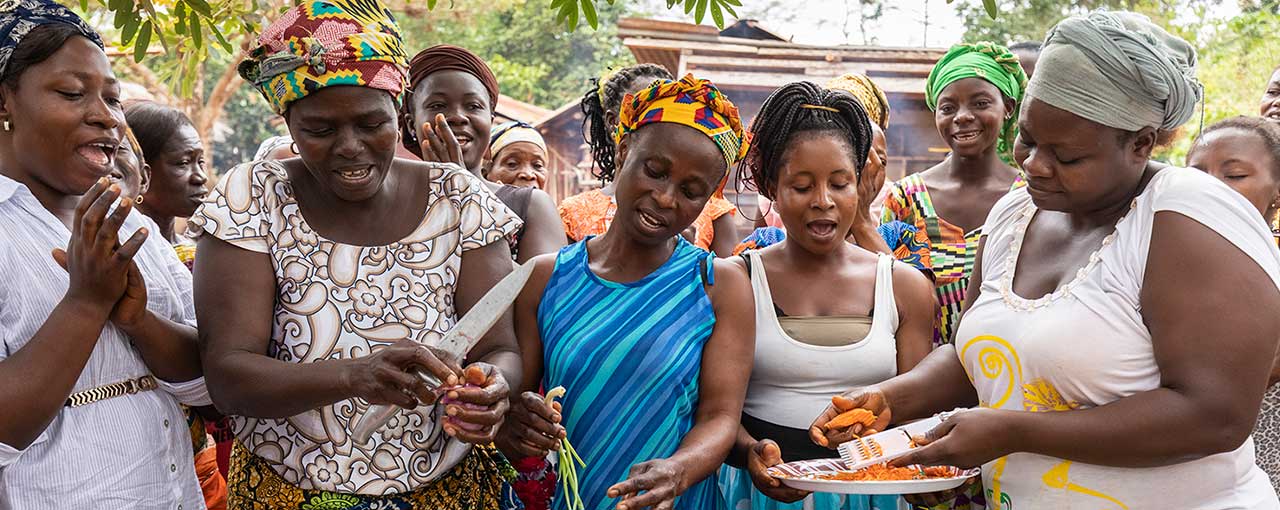Advancing gender equity in our supply chains
Women are at the heart of many farming communities as they are the vital link connecting food to tables around the world. Women in rural communities oftentimes multitask between being a farmer, an entrepreneur, a business owner while simultaneously shouldering the primary responsibility for children’s education and family nutrition.
Women are key agents for achieving economic, environmental and social change, but in many countries, women in rural communities lack the resources to reach their full potential – like economic tools, productive assets, entry to markets and proper training.
But when women thrive, so does our food system.
What we’ve learned from working with women in rural communities from Ghana to Honduras, and in all corners of the world? Investments made in gender-focused initiatives have a multiplying effect across communities -- positively impacting levels of productivity, household income, food security, and children’s education.
Cargill’s responsibility to advancing gender equity and empowerment of women and girls extends beyond our own operations into our supply chains. From our seat at the center of the agricultural supply chain, Cargill is uniquely positioned to facilitate connections that help bring new possibilities for women and girls as we strive to make the world’s food system more sustainable, resilient, and accessible for all.
Cargill works with best-in-class partners to identify and address barriers to women’s economic empowerment so that we create opportunities for women across our supply chains and communities. Together with our partners, we support hundreds of thousands of women farmers in Africa, Asia and Latin America by helping them get access to financial resources, raising food more sustainably, reaching more markets, receiving fair prices and improving their standards of living.
Our work includes technical training to strengthen their skills and confidence in sustainable agriculture practices, financial literacy, gender equity, and food and nutrition security—while also engaging with men and boys to support efforts for greater equality. Our work contributes to outcomes that are aligned with the UN Sustainable Development Goals (SDGs) to eradicate poverty and ensure all people can fulfill their potential.
Building women’s economic resilience is crucial to securing thriving supply chains. By investing in women, we invest in the future of a resilient, more sustainable food system.
Our work in action
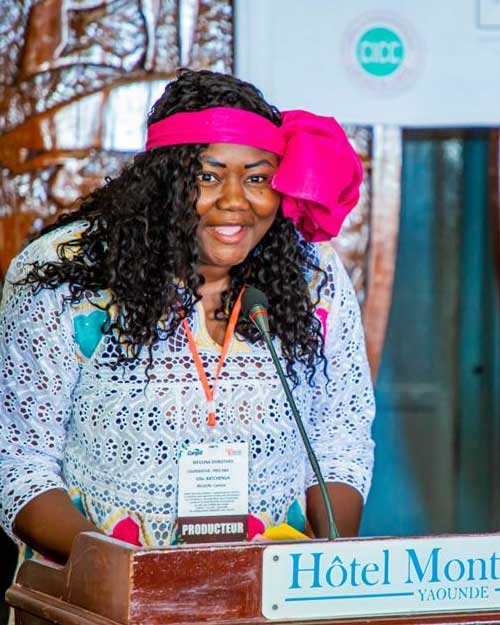
Agribusiness skills helped Dorothée become “more visible and valued” in her community in Cameroon
Dorothée Messina is a farmer in a cocoa community in central Cameroon who supports a household of 11. She’s also one of more than 1,500 women who learned agribusiness skills — from safe food practices to social entrepreneurship — through a Cargill partnership with LadyAgri to promote income diversification across households in Cameroon. The aim of the training is to help women raise higher quality produce and increase access to markets.
Today, Dorothée represents those same women as a leader of a local farming cooperative.
“We are the heart of the Cameroon food system,” Dorothée says. “LadyAgri and Cargill have helped us become more visible and valued in our communities.”
Cargill’s work with LadyAgri is just one example of how we’re using the power of partnerships — in the public and private sectors — to create a more sustainable cocoa supply chain. Cargill supports gender equity and women’s empowerment holistically and at scale through the Cargill Cocoa Promise. The Cocoa Promise enables farmers and their communities to achieve better incomes and living standards while growing cocoa sustainably. The program has been implemented in all countries where we source cocoa: Côte d'Ivoire, Ghana, Cameroon, Indonesia, Brazil and Ecuador. We focus our interventions on two areas where we can have the greatest impact on cocoa households: raising gender awareness and providing access to resources for women.
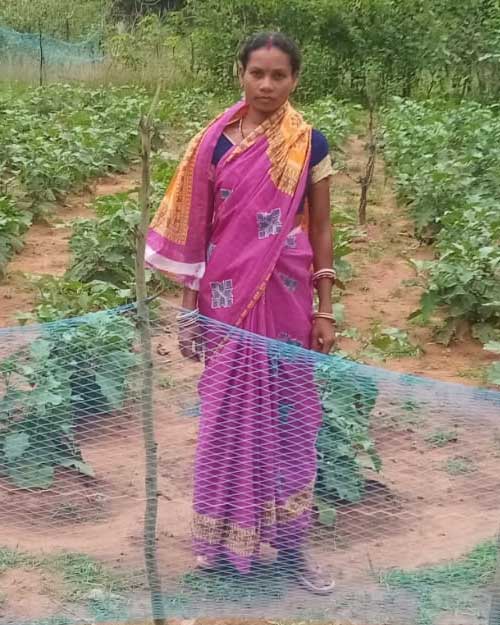
Maltilata is able to invest in her children’s education as she’s growing her poultry business
During the 2020 70+ day COVID-19 lockdown in India, many smallholder farmer communities faced the reality of having no income or ability to provide for their families. Maltilata Naik, a smallholder farmer in Asankudar, lives with her husband, mother-in-law, and two sons. Her husband, Rajkishor Naik, worked as a mason at a construction site, but his income disappeared when the lockdown started.
To provide for her family, Maltilata started raising poultry as part of the Hatching Hope Initiative, supported by Cargill. She received training on improved poultry practices. By adopting these practices, Maltilata increased her flock size from an average of 15 birds to more than 80 birds. In addition to increasing Maltilata's income, chickens have helped improve her family's nutrition with access to nutrient-dense protein.
After seeing what selling poultry can do for her family, Maltilata is optimistic about her future. "I wish to increase my flock size further and earn more income. I want to spend this on my children's education. We did not have hope earlier because we did not know how we would do this. But now, we have hope."
Cargill partnered with Heifer International in 2018 to launch Hatching Hope, which seeks to reach 100 million people by 2030 through the power of poultry production, promotion, and consumption. Since the program's inception, Hatching Hope has positively impacted the lives of more than 18 million people. In India, we have worked with 32,000 women so far.
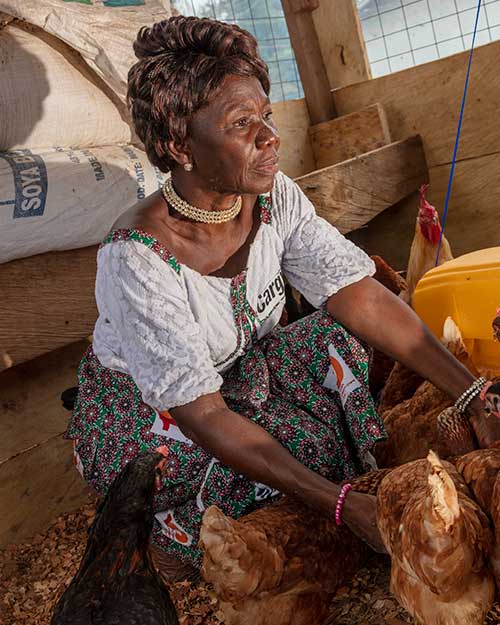
Barbara helped her entire community in Ghana improve their nutrition
Barbara Larweh is a mother of six who lives in the cocoa-growing community of Larwehkrom, Ghana. She has been an active member of the community and is respected for her leadership. She had always wanted to find new ways to support her community -- she just didn’t know how or where to begin.
With the help of CARE and Cargill, Barbara learned homestead gardening to grow enough food to support her household. Barbara started as a volunteer but quickly rose to becoming an executive member of the Community Development Committee.
She then got a loan from her Village Savings and Loan Association (VSLA) to buy chickens and learned to rear them at home. “They came and trained me on the VSLA. I dedicated myself and volunteered so that I would be able to train my people, too,” Barbara explains. “I started with nine women and six men. When we started, in the first year, we were able to accumulate 50,000 Ghana currency. We had a profit, and so we shared it.”
The homestead food production training helped the community improve their nutrition and diversify their diets, and through the village savings and loan associations, Barbara and the other local entrepreneurs were able to move beyond food security to financial security through income diversification.
CARE and Cargill are longstanding partners; for more than 60 years, the two organizations have collaborated to develop and implement 34 distinct programs that reached more than 4.6 million people across 13 countries, including Côte d'Ivoire, Ghana, Guatemala, Honduras, and Indonesia. Barbara is part of the CARE and Cargill program called Promoting a Sustainable and Food Secure World (PROSPER) aimed at increasing gender equitable food security by economically empowering women.
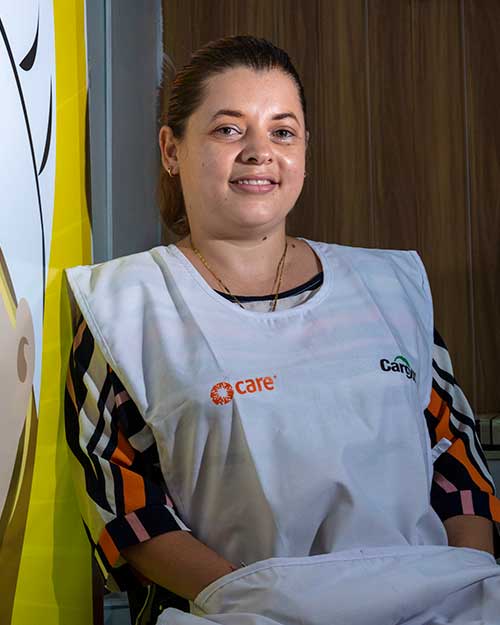
Elisa runs a growing fast-food restaurant in the town of Villanueva, Honduras
“Sometimes people think that a 31-year-old woman can’t run a business.” Elisa started her business with 1,000 lempiras, which is about 40 USD. Little by little, Elisa has been expanding her business every year. Through the Nutriendo el Futuro project, run by NGO partner CARE and with support from Cargill, Elisa attended business trainings which taught her about business planning and bookkeeping. The trainings also helped grow her confidence: “Thanks to the trainings, I understood that I must speak up.” She’s already passing on her knowledge to the next generation – her son has already started a toy business in Elisa’s restaurant. She sells the toys for him and teaches him the importance of saving his earnings to be able to reinvest.
For over a decade across Central America, Cargill and CARE have implemented Nutriendo el Futuro, which is designed to ensure agricultural communities are prosperous and resilient, and that healthy eating habits are strengthened in homes and schools. The program has reached more than 55,000 people directly and more than 1.4 million people indirectly over the past three years. Of the total number of people supported, 67% were women. The program has focused on women’s empowerment, access to resources on good agricultural practices (GAPs), and access to inclusive markets and nutrition.

